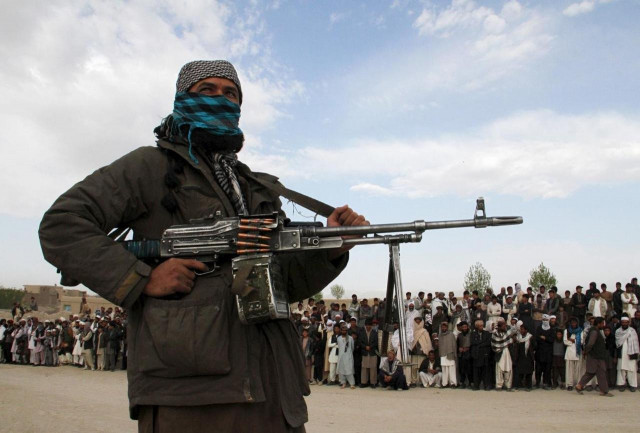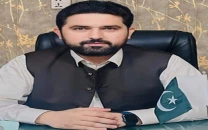Pakistan terms TTP a global security threat
Akram demands UN probe into TTP’s advanced weaponry

Pakistan on Wednesday asked the United Nations to undertake an investigation to find out how the TTP acquired advanced military equipment and weaponry and to identify the sources of the terrorist gourp’s financing, which is helping it sustain 50,000 fighters and their dependents and its operations.
Taking part in the debate at the UN Security Council on Afghanistan, Pakistan's permanent representative to the UN in New York Ambassador Munir Akram also urged the UNSC to join Islamabad in its demand from the interim Afghan government to sever its ties with the banned Tehreek-e-Taliban Pakistan (TTP).
The UNSC discussed the current Afghan situation in the light of briefing given by Special Representative of the Secretary General and Head of UNAMA Roza Otunbayeva.
"I am confident that this Council will join Pakistan in demanding that the AIG terminates its relationship with the TTP and its affiliates and prevents them from having free rein to conduct cross-border attacks against Pakistan or other neighbors," Ambassador Munir said.
Read more: Afghan Taliban nudge TTP on talks with Islamabad
He warned that if left unchecked, the TTP, supported by Al Qaeda and some state sponsors, could soon pose a global terrorist threat. "The UNAMA mandate does not cover issues relating to terrorism. Yet, terrorism, within and from Afghanistan, poses the most serious impediment to normalization in Afghanistan," he cautioned.
The terrorist organisations, he added, present there pose a security threat to each one of Afghanistan’s immediate neighbours. "Counterterrorism must be the highest priority in any future Road Map for engagement with the Afghan Interim Government," he said laying out clear conditions for any engagement.
Many countries including the US, China, Russia, the UK and India took part in the debate. China and Russia favoured continued dialogue with the Afghan Taliban and release of frozen funds and lifting of sanctions on the Taliban leadership.
The Pakistani envoy said despite concerns Pakistan continued to provide the principal avenue for humanitarian help, trade and development for the people of Afghanistan.
"We will continue to offer this support. The destinies of Pakistan and Afghanistan are intertwined. Peace, security and prosperity in Afghanistan are an imperative for Pakistan," he added.
He objected to the UN report on the forced explusion of Afghan refugees from Pakistan. "While we take note of the Secretary-General’s report (in document S/2024/196), I must express our disappointment at the some of its observations which are factually incorrect and fail to take account of the context of some of the developments covered in the report."
"It is untrue to assert that there were “large scale forced returns of undocumented Afghans from Pakistan” or that there was “large scale return of refugees from Pakistan”.
Also read: TTP member remanded
"In fact, after Pakistan declared the intention to apply its laws regarding the presence of illegal and undocumented aliens on our territory, about 500,000 undocumented Afghans chose to return to Afghanistan, Ambassador Munir said.
"They were not forced. 98 per cent of these returns were voluntary in nature. The 2 per cent who were deported included people who were involved in terrorism, drug smuggling and other crimes, or were convicted prisoners who had completed their jail terms."
"We find the assertion in the report of an “unfavorable protection environment in Pakistan” particularly offensive."
He said Pakistan has sheltered almost 5 million Afghan refugees for over 40 years at great economic, social and security cost to our country and to our society, with little help from the international community.
"Even today, over one million undocumented Afghans remain in Pakistan. They should return forthwith. We have made several exceptions for those with Afghan ID cards, POR cards, for those who may be “vulnerable” if they return, and for the over 60,000 Afghans which third countries have offered to receive but have not done so for over two years."
"Nor have we, Mr. President, so far, asked for the return of the 1.4 million registered Afghan refugees in Pakistan. But if the UN believes that the “protection environment” is unfavorable, it should arrange forthwith for their early repatriation."
Regarding the reported border incidents, the exchange of fire by Pakistani security forces was always in response to cross border attacks by the TTP and its affiliates against Pakistan’s border posts and installations, he said.
"We would expect the UN to call on the Afghan Interim Government to prevent such cross-border attacks and infiltration by the TTP and other terrorists into Pakistani territory."
He said these terrorist groups include Daesh, Al Qaeda and particularly the TTP and its affiliates, who are responsible for persistent attacks against Pakistan’s military and civilian targets.
"The AIG’s failure to control the TTP and other terrorist groups erodes its claim of full control of its territory that it asserts in order to secure international recognition" he said.
Outlining the country's strategy, he said Pakistan considers sustained engagement with the Afghan Interim Government to be essential to normalize the situation in Afghanistan.
"We hope consensus can be developed on the recommendations made by Ambassador Feridun Sinirlioğlu in his report. We should develope a realistic roadmap with reciprocal steps by the Afghan Interim Government and the international community leading to the end state of normalization in Afghanistan and its integration within the international community."
He said Pakistan regrets that the Afghan interim government did not participate in the second Doha meeting convened by the Secretary-General. "This was a missed opportunity for engagement with the international community. Both the Afghan Interim Government and the international community must be pragmatic in their expectations and demands on the pathway to normalization."
He said Pakistan would welcome the appointment of a Special Envoy on Afghanistan. "However, he/she should have a clear mandate; be acceptable to the AIG and regional countries and be selected after consultations with all concerned."
He further said Pakistan was open to the idea of establishing a smaller international contact group (ICG), provided it brings “added value” and does not replace or duplicate existing regional formats. It should exclude “spoilers” from its membership.



















COMMENTS
Comments are moderated and generally will be posted if they are on-topic and not abusive.
For more information, please see our Comments FAQ